- Home
- Christine Rimmer
Scrooge and the Single Girl Page 3
Scrooge and the Single Girl Read online
Page 3
She did know there was tragedy in Will’s past. A few years ago, he’d lost a woman he truly loved. Her name had been Nora. But Jilly had only heard about her in passing.
“Poor Will,” Jane had said a month or so ago. “He was so in love. Did you know? Her name was Nora. Cade told me he’s still not really over her, even after five years….”
And about a week later, Celia had mentioned that Will and Nora had planned to be married. And that Nora had died before the wedding.
But Jilly never got the details. She didn’t let herself ask for them. It had never been anything solid, anyway, those stirrings of attraction she’d felt for Will. And in the end, he’d squashed her feelings flat, leaving her exceedingly glad that she hadn’t said a word.
Jilly dug her phone out of her purse and pushed the Talk button—and got the same crackling static she’d gotten earlier, when she’d tried to call Caitlin.
“Wonderful.” She tossed the phone down on the bed and let out a groan of frustrated boredom.
She thought of the Cheez Doodles she’d left out in the car. A bag or two could really help to get her through the night. And while she was at it, she could also grab her boom box and CDs. Since Caitlin had warned her that the cabin had no television or stereo, Jilly had brought along the boom box and a thick black zippered folder full of tunes. And not only that. Now that she thought about it, she remembered she’d stuck a few intriguing novels in her overnighter. The evening didn’t have to be a total bust, after all.
On the negative side, getting the snacks and the music would mean another freezing excursion out to her car. But not to worry. There was good news here. This time she could handle it herself in a single trip. No need to get the scrooge downstairs involved.
Her coat and hat were waiting where she’d left them, on the pegs by the door. She was pulling on the coat when Will said, “What’s going on?”
She flipped her hair out from under her collar and reached for her hat. Only then did she bother to face him.
He was sitting in the easy chair in the living area, reading his big, fat Russian novel. He’d dug up an old radio from somewhere and had it tuned in to what sounded like it might be an NPR talk show, though he had it down so low, who could say for sure? Missy lay curled in a ball on the rag rug at his feet, looking as if she belonged there. The cat seemed to like him—a lot. While Jilly understood that cats were contrary by nature, the idea of her own sweet Missy developing a kitty crush on Will Bravo didn’t please her at all. To Jilly’s mind, it was carrying contrariness altogether too far, not to mention that it bordered on disloyalty, considering the way Jilly felt about the man.
“I’m going out to my car. I forgot a few things.”
He frowned. “It’s pretty wild out there. Are you sure you can’t get along without whatever it is?”
“Oh, yes. Absolutely. We’re talking utter necessities.” She smiled brightly and gave him an emphatic nod.
He was slanting her a doubtful look. “You need some help?” He didn’t sound terribly anxious to get up from that comfortable chair and trudge out into the freezing, windy darkness.
But at least he had offered. She said, more pleasantly than before, “No, thanks. I can manage.”
He shrugged and went back to his big, boring book.
She pulled open the door and went out into the icy night. A huge gust of wind came roaring down the porch just as she stepped over the threshold, so she had to struggle with the door in order to get it shut. Then she wrapped her coat close around her, hunched her shoulders against the cold and headed for her car.
The snow was thicker on the ground than it had been the last trip out. And the storm itself seemed worse, the wind crueler, the snow borne hard on it, not falling at all, but swooping in sideways, stinging when it hit her cheeks. The branches of the pines that rimmed the clearing whipped wildly, making those strange, ghostly crying noises as the wind rushed between them. Jilly forged on to her car, passing beneath that lone maple tree, hearing those creepy crackling sounds, like bones rubbing together, as the branches scraped against each other.
At the Toyota, she hauled up the hatch and crawled inside. She got the boom box from the back seat, then climbed over that set of seats and got the CD folder from where she’d left it on the front passenger side. Then she backed out, grabbing a bag of Cheez Doodles on her way. She almost reached for her laptop, too. But it would just be something else to drag back outside tomorrow morning when she loaded up to leave, so she vetoed that idea.
Easing her boots down to the snowy ground, she got the hatch shut. She had the CD folder tucked under an arm and the boom box and the bag of cheese snacks in either hand as she started for the house.
She got as far as the big maple tree when a particularly hard gust of wind struck. She heard a sharp, explosive sound and glanced up just in time to see the heavy bare branch come crashing down on top of her.
Chapter Three
That cat of Jillian’s got up and stretched. It had started purring again. Loudly. It sat and licked its right front paw for a minute or two, then swiped the paw twice over its tattered ear. And then it just sat there, >looking up at him. Adoringly.
Will found the situation nothing short of unnerving. “Get lost,” he growled.
The cat didn’t move. The purring, if anything, seemed to grow louder. Mentally, Will drew the line. If that animal started rubbing itself against his leg, he was going to kick it. Firmly.
He didn’t like cats. Or dogs. Pets in general left him cold. Strangely, most animals seemed to like him. He didn’t get it. He just wished they would leave him alone.
The cat rose up on all fours and took a step toward him.
“Don’t,” he said loudly.
The cat dropped to its haunches again and went back to staring and purring with low, dreamy eyes. Will stared back for another two or three seconds, a hard stare, a stare meant to impart how unwelcome he found the attention of animals in general and raggedy-eared calico cats in particular. The cat stayed where it was. He began to feel it would be safe to get back to his book.
He had just lowered his gaze to the open volume in his lap when a particularly hard gust of wind wailed outside. Faintly, he heard that popping crack—like a distant pistol shot. He recognized the sound. A nearby tree had lost a good-sized branch.
He glanced up in time to see the cat blink and perk up its one good ear. Reluctantly, he thought of Jillian. Was it possible that she—?
Ridiculous. No way she could have managed to walk under the wrong tree at exactly the wrong moment. He was just edgy because it was Christmastime, and in his experience, at Christmastime, if something bad could happen, it would.
He shook his head and looked down at his book again. These interruptions were damned irritating. As if he didn’t have enough trouble keeping all those Russian names straight even under the most ideal of circumstances.
He read on. One page. Two.
How long had she been out there, anyway? Five minutes? More?
He looked up again. This time he found himself staring at the door, waiting for her to come bursting through it, that mouth of hers going a mile a minute, her arms full of whatever it was she just couldn’t last a whole night without.
But it didn’t happen. The door stayed closed.
So what? he tried to tell himself. She was Jillian, after all. Who knew what went on with a woman like that? She was probably only dithering as usual, fiddling with all those grocery bags, deciding she needed this or that, then changing her mind.
He tried to go back to his book one more time.
But it was no good. She’d been out there too long.
He swore and slammed the book shut.
Jilly blinked. For some strange reason, she was lying down, looking up through the bare branches of a tree at the stormy night sky. The wind was blowing hard and the snow was coming down and it was very cold. Also, she had a doozy of a headache.
She moaned and put a hand to her head, felt somethin
g warm and sticky. “Eeuu,” she said. “Ugh.”
Really, it was too cold to be lying around in the snow.
With effort, she turned over and got up on her hands and knees. From that position, though she found she swayed a little, she could see the tree branch that had hit her. It was directly in front of her. The memory of that split second before impact came back to her. She supposed it was a good thing she’d looked up when she did. As a result, it hadn’t landed right on top of her but had only kind of grazed her forehead. She touched the tender, bloody spot again. A goose egg was rising there. Now, that was going to be really attractive.
And wait a minute. Her hair was blowing into her mouth, plastered against her cheeks. Which meant her hat was gone. Now, where could it have—?
“Whoa,” she said as she realized she was listing to the right. She put her hand back down on the freezing snow. It sank in about five inches, all the way to the hard, rocky ground below.
Better, she thought—if, in this situation, there was such a thing. At least on all fours, she could keep her balance.
She turned her head—slowly, since it did ache a lot—to the right. Through the blowing tendrils of her hair, she saw a bag of Cheez Doodles and a tree trunk. She looked the other way, saw her boom box and CD folder and beyond that a ways, an old house.
Ah. She remembered everything now. That was Mad Mavis’s house. She was staying there. Just for the night, as it had turned out. Will Bravo was in there, reading Crime and Punishment, listening to National Public Radio, and, she hoped, beginning to wonder why she hadn’t come back in yet.
But no. Forget Will. He didn’t like her. He didn’t want her here. It would be a big mistake just to lie here, waiting for him to put down his book and come out and rescue her.
And besides, she was an independent, self-reliant woman and that meant she could take care of herself. She’d got herself into this jam and, by golly, she’d get herself out.
Could she stand?
Carefully, she lifted one hand again—and almost pitched sideways. She put the hand down.
“Ho-kay,” she muttered to herself. “Standing up goes in the Doubtful column.”
She glanced with regret at her Cheez Doodles. But there was no hope for getting them—or the boom box or the CDs—inside. Not this trip. She needed both hands in order to crawl.
So she started moving, slowly, with difficulty, more dragging herself, really, than crawling. She was thinking that if she could just make it to the porch, she could pound on the wall and Will would come out and help her the rest of the way. He might be a jerk, but he wasn’t a total monster. Maybe she could even convince him to go get her Cheez Doodles and her tunes—not that she was counting on that. Oh, no. Just hoping.
She was perhaps a quarter of the way to the porch when she started thinking that maybe she could force herself upright, stagger forward for a while and then go ahead and continue crawling when she fell down again. Yes. That would probably work. She really was feeling less dizzy by the second, which was a very good thing, as the less dizzy she was, the faster she could get herself back inside and out of this bone-chilling cold. She levered up onto her knees.
Miracle of miracles, she stayed there. Her teeth were chattering harder than ever, but she didn’t think she was going to fall over just then. She shoved at her unruly, wet hair, pushing it out of her eyes. Next step, bring one foot forward and—
But she didn’t get to that, because right then, she noticed that Will was striding toward her through the snow.
In no time at all, he was looming above her. “Damn it, Jilly.” The wind was making a lot of noise, and he spoke softly, for once. But still, she made out what he said.
Hey, she thought. Jilly. For the first time, he’d called her Jilly. Was this progress—or just a wild hallucination brought on by a blow to the head?
She didn’t much care. “You know, I have to admit it. I’m really glad to see you.”
He didn’t reply to that. She wondered if she’d even managed to say it aloud. And then she forgot to wonder as he knelt down and scooped her up into his strong arms, pulling her close to his hard, warm chest. She hooked an arm around his neck and buried her face against his shoulder with a sigh, all the reasons she disliked him for that moment forgotten.
Her head throbbed as he rose to his feet again, but the pain hardly registered. She was just so grateful he had come out and found her. She snuggled closer as he carried her into the house, stopping to stomp the snow off his boots before he went in, kicking the door closed with great authority once they’d crossed the threshold into the warmth and the light.
He took her to the narrow iron bed that served as a sofa and gently laid her down. He tucked pillows tenderly beneath her head. With care, he smoothed her snow-wet hair away from her face, frowning, looking at the goose egg swelling at her temple.
“Is it bad?” she asked.
“I’ve seen worse.” He patted her arm in doctorly fashion. He’d been such a complete crab since she’d knocked on his door that evening, it came as a pleasant surprise to learn that he could drum up a very respectable bedside manner when he had to.
Her booted feet, still encrusted with snow, hung over the side of the couch. He dropped down there and undid the laces and slid them off. She went ahead and straightened herself out on the couch as he stood.
“Right back,” he said, and left her. She watched him set her boots by the door and then, still wearing his jacket, he disappeared behind the half-wall that marked off the living area from the kitchen.
She groaned and felt the bump at her temple. Her fingers came away smeared with blood. But it wasn’t too bad. She strained to look down at herself. Everything in the right place, it seemed to her. And there wasn’t that much blood. She could see a few drops on her coat, but nothing to get too worried about.
He returned with an ice pack and a damp cloth, sat down beside her and oh-so-gently began dabbing at her temple.
She winced. “Let me…”
He gave her the cloth. She cleaned herself up. Then he passed her the ice pack. She set the soiled cloth on the table beside her and pressed the ice pack over the bump. It felt good. Soothing.
He peered more closely at her, his brow furrowed. “Do you know who I am?”
That made her smile. “As if I could ever forget.”
He actually smiled back—well, almost. There was a definite lift at the corners of his mouth. “Tell me.”
“Your name is Will Bravo—and thanks. For coming out and checking on me.”
“No problem. Are you hurt anywhere else, except for that bump on your head?”
She considered a moment. “No. Nowhere. Everything’s fine.”
“Did you lose consciousness?”
“For a minute or two, I think.”
He got up again and went through the curtain at the end of the makeshift sofa. He came out with a cell phone, punched a button on it. But when he put it to his ear, he shook his head.
“Not working, huh?”
He turned the phone off and set it down. “I’m afraid you’re right.”
“I tried mine earlier. It didn’t work either.”
“The storm, probably—not that cell phones ever work all that well up here.”
“How comforting.”
“I was going to call 911.” His mouth twisted ruefully.
“It’s all right. I’ll be fine. Though I could use an aspirin or two.”
He frowned. “Better not.”
She dragged herself to a sitting position. “Because?”
He looked at her for a long moment. “You are feeling better.”
“I am. Better by the minute.” She slipped off her coat, one arm and then the other, switching hands to keep the ice pack over her injury. “If I could just have that aspirin. Or Tylenol. Or—”
“No. You should wait, I think. See if you develop any symptoms.” He took the coat from her and went to hang it by the door.
She asked, “Symptoms of
…?”
“Serious brain injury.”
She pulled the ice pack away from her forehead and gingerly poked at the goose egg. “My brain is fine.” He turned toward her again, clearing his throat in such a way that she knew just what he was thinking. “Don’t go there,” she muttered.
“I don’t know what you’re talking about—and keep that ice pack on that bump.”
“Right. Tell me more about these possible symptoms.”
“Things like nausea, disorientation, seizures, vomiting…”
It wasn’t going to happen. As she kept trying to tell him, she was just fine. “And if I do develop those symptoms, then what?” He was back to his old self again, glaring at her. She told him what. “Nothing. Because there’s nothing we can do. We can’t call 911. The phones don’t work. We can’t get out of here because of the storm. We’re not going anywhere until tomorrow, at least.”
“And your point is?”
“There’s nothing to wait for, no medical professionals to consult. What happens, happens—though, as I keep telling you, I’m going to be fine. So could I please have a couple of Tylenol?”
He disappeared into the depths of the kitchen. He was back maybe two minutes later, with a glass of water and the pills she’d asked for. She took them. “Thank you.”
He waited until she’d set the empty glass on the little table beside the sofa bed and then he asked, “Where are the things you went outside to get?”
She confessed, “I left them where they fell, under that tree out there. I couldn’t carry them and crawl at the same time.”
“And what, exactly, are they?”
Reluctantly, she told him.
He grunted. “Absolute necessities, huh?”
“So I exaggerated—and don’t worry, I don’t expect you to—”
But he was already turning for the door again. She let him go. It wasn’t really dangerous out there, between the house and the vehicles—as long as you didn’t have the misfortune to be under a tree when it lost a big branch. And what were the odds of that happening again?
No worries. He’d be fine.

 The Right Reason to Marry
The Right Reason to Marry Same Time, Next Christmas (The Bravos 0f Valentine Bay Book 3)
Same Time, Next Christmas (The Bravos 0f Valentine Bay Book 3)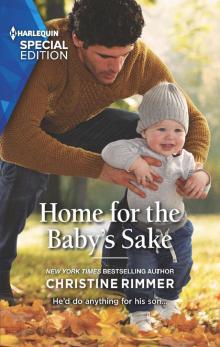 Home for the Baby's Sake
Home for the Baby's Sake In Search 0f The Long-Lost Maverick (Montana Mavericks: What Happened To Beatrix? Book 1)
In Search 0f The Long-Lost Maverick (Montana Mavericks: What Happened To Beatrix? Book 1) A Temporary Christmas Arrangement
A Temporary Christmas Arrangement Switched At Birth
Switched At Birth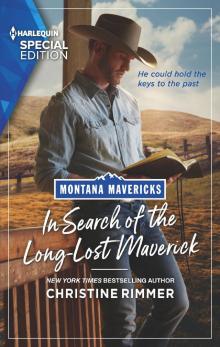 In Search of the Long-Lost Maverick
In Search of the Long-Lost Maverick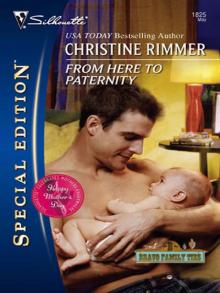 From Here to Paternity
From Here to Paternity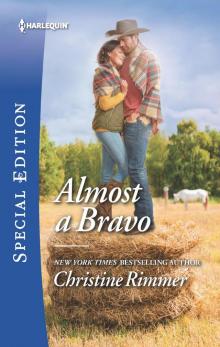 Almost a Bravo
Almost a Bravo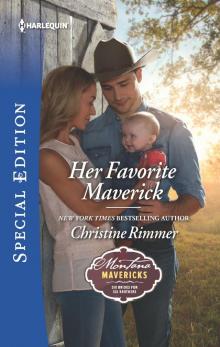 Her Favorite Maverick
Her Favorite Maverick A Husband She Couldn't Forget
A Husband She Couldn't Forget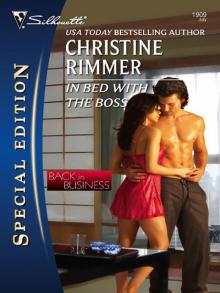 In Bed with the Boss
In Bed with the Boss Bravo Christmas Reunion
Bravo Christmas Reunion The Maverick Fakes a Bride!
The Maverick Fakes a Bride!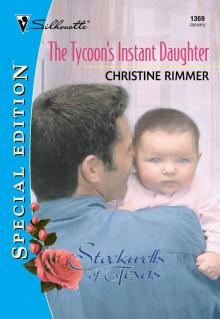 The Tycoon's Instant Daughter
The Tycoon's Instant Daughter The Bravo Bachelor
The Bravo Bachelor 37 Her Highness and the Bodyguard
37 Her Highness and the Bodyguard A Bravo for Christmas
A Bravo for Christmas THE BRAVO BILLIONAIRE
THE BRAVO BILLIONAIRE The Rancher's Christmas Princess
The Rancher's Christmas Princess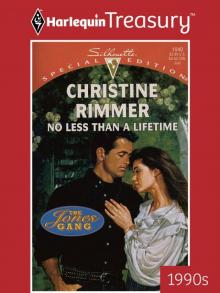 No Less Than a Lifetime
No Less Than a Lifetime A Bravo Christmas Reunion
A Bravo Christmas Reunion Marooned with the Maverick
Marooned with the Maverick Their Secret Summer Family (The Bravos 0f Valentine Bay Book 7)
Their Secret Summer Family (The Bravos 0f Valentine Bay Book 7) Carter Bravo's Christmas Bride
Carter Bravo's Christmas Bride Stroke of Fortune
Stroke of Fortune THE MILLIONAIRE SHE MARRIED
THE MILLIONAIRE SHE MARRIED Marriage, Bravo Style!
Marriage, Bravo Style!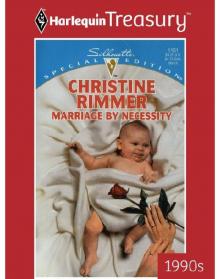 Marriage By Necessity
Marriage By Necessity Marrying Molly
Marrying Molly Married in Haste
Married in Haste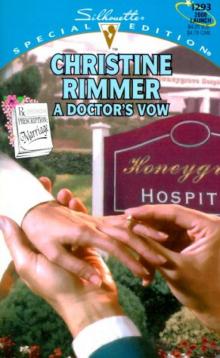 A DOCTOR'S VOW
A DOCTOR'S VOW Bravo Unwrapped
Bravo Unwrapped![A Maverick to [Re]Marry Read online](http://i1.bookreadfree.com/i/03/24/a_maverick_to_remarry_preview.jpg) A Maverick to [Re]Marry
A Maverick to [Re]Marry Born Innocent
Born Innocent The Bravo Family Way
The Bravo Family Way The Reluctant Princess
The Reluctant Princess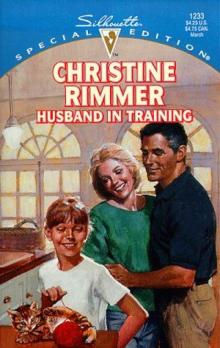 Husband in Training
Husband in Training HOLIDAY ROYALE
HOLIDAY ROYALE James Bravo's Shotgun Bride
James Bravo's Shotgun Bride The Maverick's Accidental Bride (Montana Mavericks: What Happened At The Wedding Book 1) (Contemporary Cowboy Romance)
The Maverick's Accidental Bride (Montana Mavericks: What Happened At The Wedding Book 1) (Contemporary Cowboy Romance) The Stranger and Tessa Jones
The Stranger and Tessa Jones Practically Married
Practically Married The Good Girl's Second Chance (The Bravos Of Justice Creek 2)
The Good Girl's Second Chance (The Bravos Of Justice Creek 2)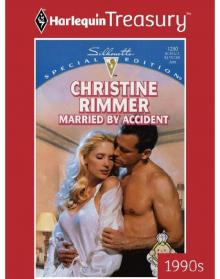 Married by Accident
Married by Accident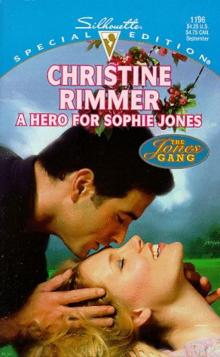 Christine Rimmer - A Hero for Sophie Jones
Christine Rimmer - A Hero for Sophie Jones A Bravo Homecoming
A Bravo Homecoming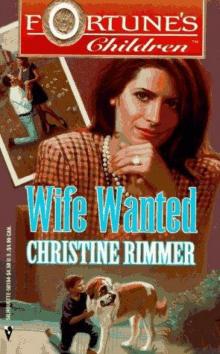 Wife Wanted
Wife Wanted Harlequin Special Edition July 2013 - Bundle 1 of 2: Marooned with the MaverickHer McKnight in Shining ArmorCelebration's Bride
Harlequin Special Edition July 2013 - Bundle 1 of 2: Marooned with the MaverickHer McKnight in Shining ArmorCelebration's Bride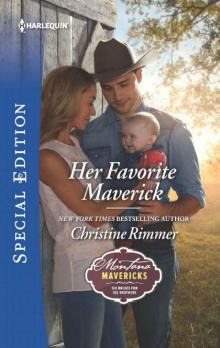 Her Favorite Maverick (Montana Mavericks: Six Brides For Six Brother Book 1)
Her Favorite Maverick (Montana Mavericks: Six Brides For Six Brother Book 1) A HOME FOR THE HUNTER
A HOME FOR THE HUNTER![A Maverick to [Re] Marry Read online](http://i1.bookreadfree.com/i1/04/03/a_maverick_to_re_marry_preview.jpg) A Maverick to [Re] Marry
A Maverick to [Re] Marry Lori’s Little Secret
Lori’s Little Secret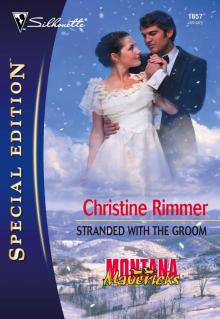 Stranded with the Groom
Stranded with the Groom Sunshine and the Shadowmaster
Sunshine and the Shadowmaster The Last Single Maverick
The Last Single Maverick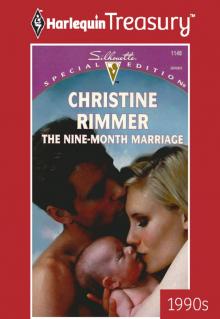 The Nine-Month Marriage
The Nine-Month Marriage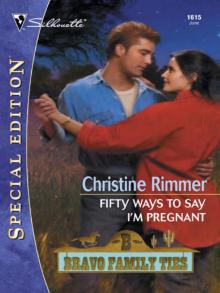 Fifty Ways to Say I’m Pregnant
Fifty Ways to Say I’m Pregnant Ms. Bravo and the Boss
Ms. Bravo and the Boss The Marriage Conspiracy
The Marriage Conspiracy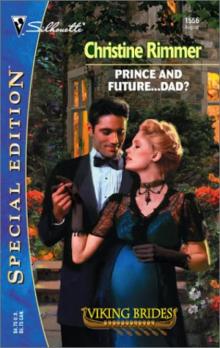 Prince and...Future Dad
Prince and...Future Dad Not Quite Married
Not Quite Married The Reluctant Cinderella
The Reluctant Cinderella Their Child?
Their Child? Marriage, Maverick Style!
Marriage, Maverick Style! Donovan's Child
Donovan's Child A Bride for Jericho Bravo
A Bride for Jericho Bravo THE M.D. SHE HAD TO MARRY
THE M.D. SHE HAD TO MARRY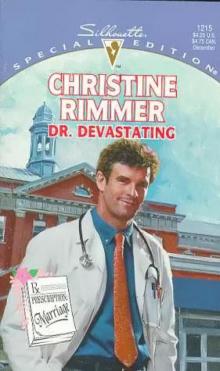 DR. DEVASTATING
DR. DEVASTATING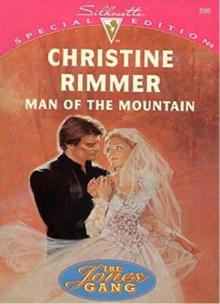 MAN OF THE MOUNTAIN
MAN OF THE MOUNTAIN The Prince's Cinderella Bride
The Prince's Cinderella Bride Rachel's Bundle of Joy
Rachel's Bundle of Joy HOW TO MARRY A PRINCESS
HOW TO MARRY A PRINCESS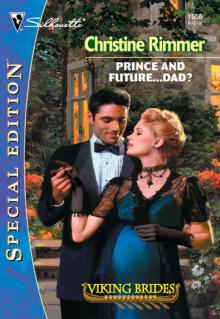 Prince and Future... Dad?
Prince and Future... Dad? The Prince She Had to Marry
The Prince She Had to Marry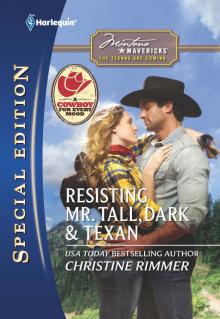 Resisting Mr. Tall, Dark & Texan
Resisting Mr. Tall, Dark & Texan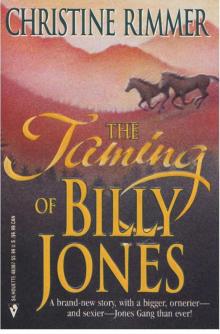 The Taming of Billy Jones
The Taming of Billy Jones McFarlane's Perfect Bride
McFarlane's Perfect Bride The Lawman's Convenient Bride
The Lawman's Convenient Bride The Man, The Moon And The Marriage Vow
The Man, The Moon And The Marriage Vow A Bravo Christmas Wedding
A Bravo Christmas Wedding Scrooge and the Single Girl
Scrooge and the Single Girl Harlequin Special Edition October 2015, Box Set 1 of 2
Harlequin Special Edition October 2015, Box Set 1 of 2 The Marriage Medallion
The Marriage Medallion Cinderella's Big Sky Groom
Cinderella's Big Sky Groom 33 The Return of Bowie Bravo
33 The Return of Bowie Bravo The Prince's Secret Baby
The Prince's Secret Baby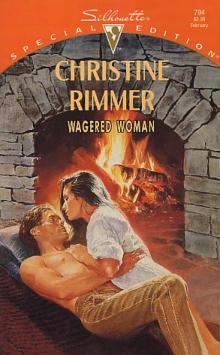 WAGERED WOMAN
WAGERED WOMAN